UNIT 11 CONFLICT AND COMPROMISE LESSON 3课件(共43张,内嵌视频)-高中英语北师大版(2019)选择性必修第四册
文档属性
| 名称 | UNIT 11 CONFLICT AND COMPROMISE LESSON 3课件(共43张,内嵌视频)-高中英语北师大版(2019)选择性必修第四册 |
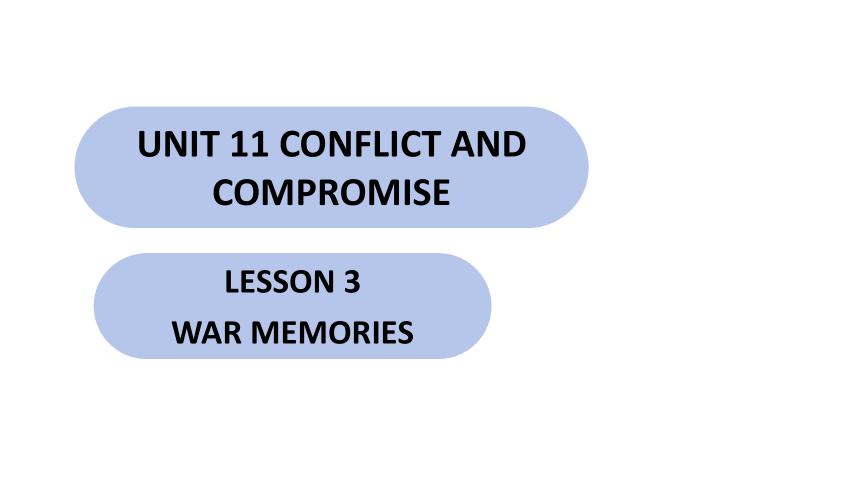
|
|
| 格式 | pptx | ||
| 文件大小 | 42.7MB | ||
| 资源类型 | 教案 | ||
| 版本资源 | 北师大版(2019) | ||
| 科目 | 英语 | ||
| 更新时间 | 2025-04-01 20:42:10 | ||
图片预览

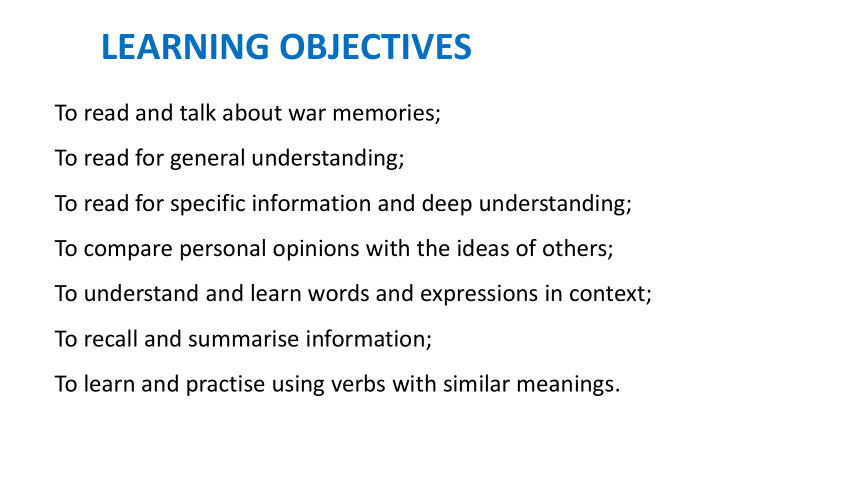
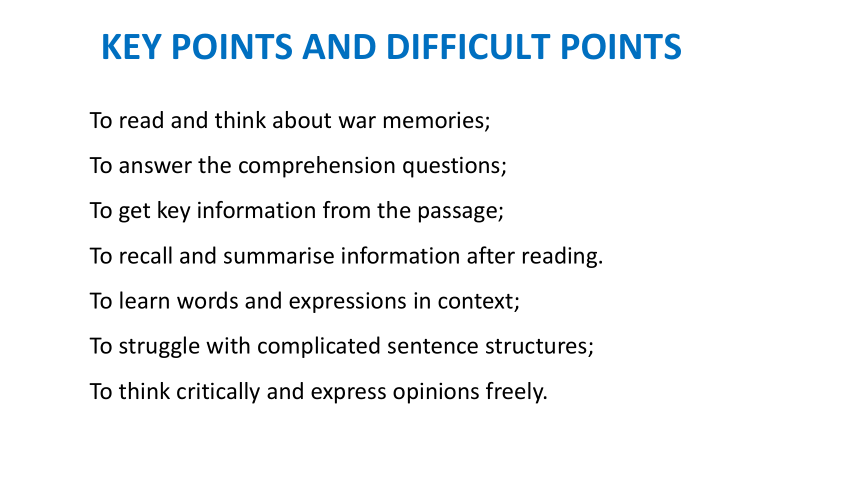

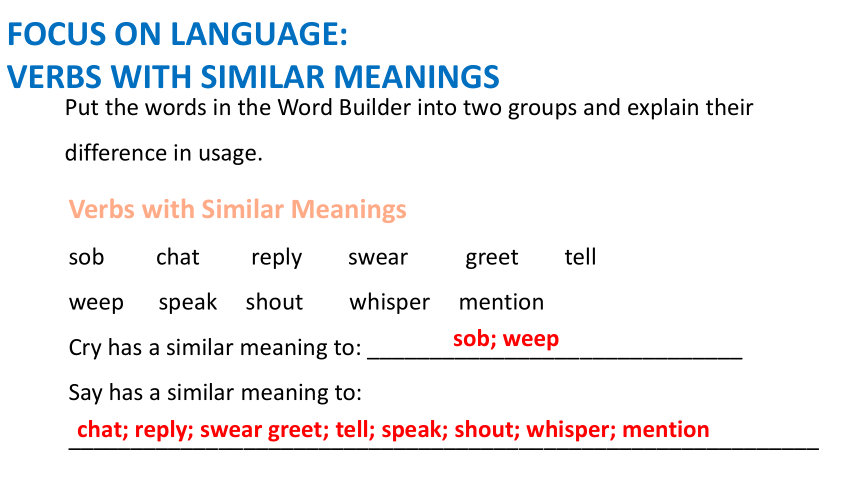
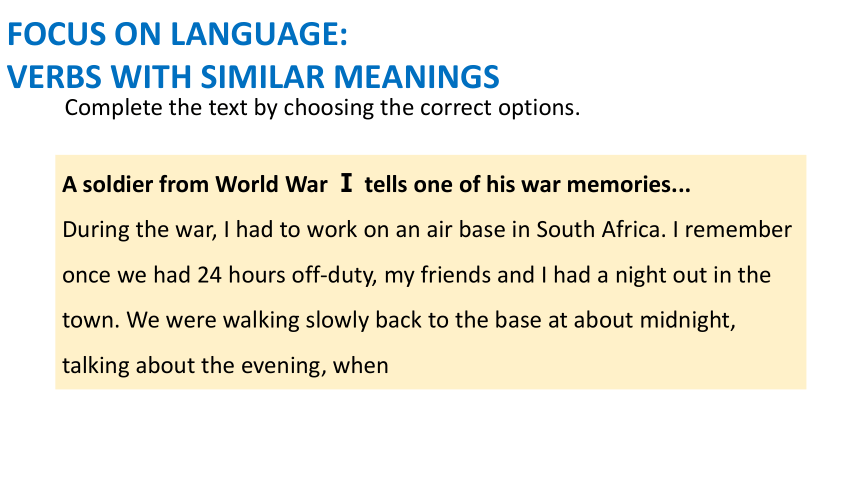
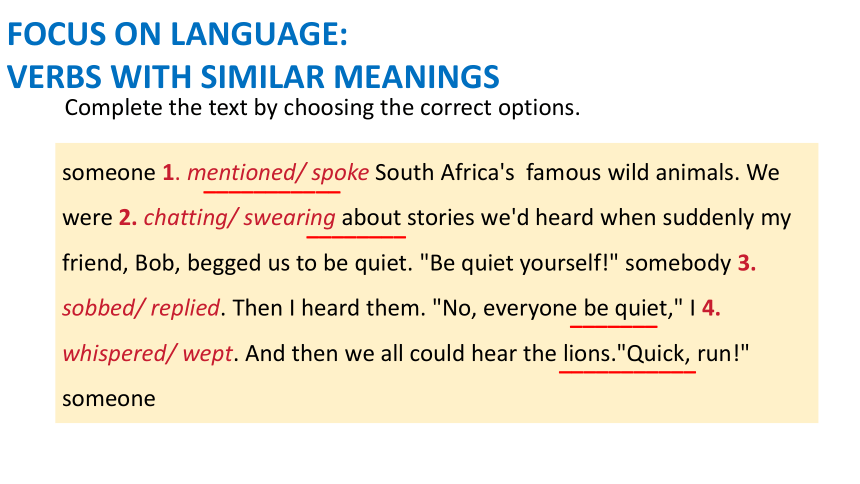
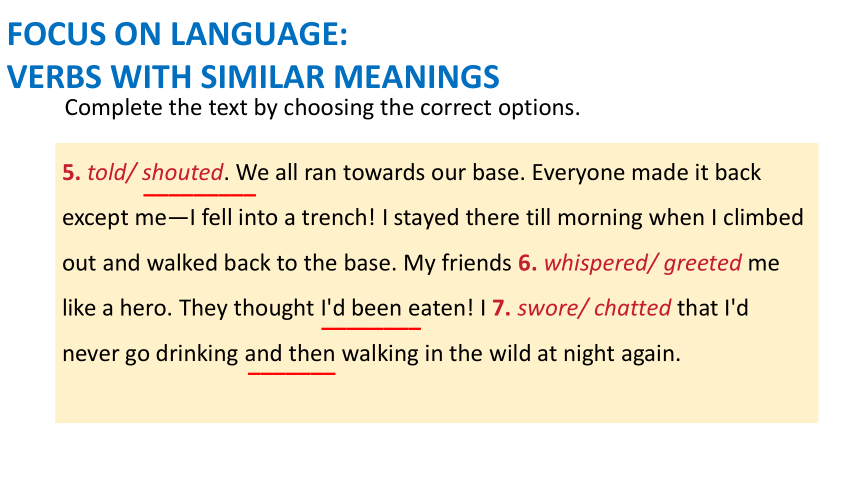

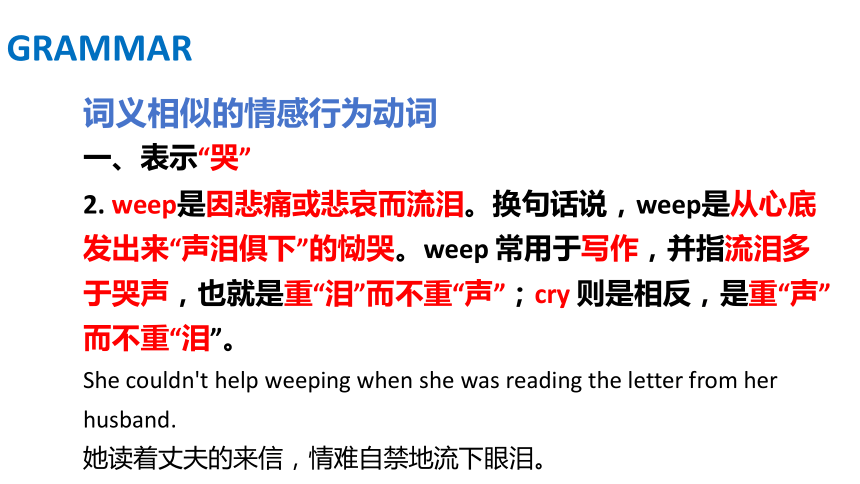

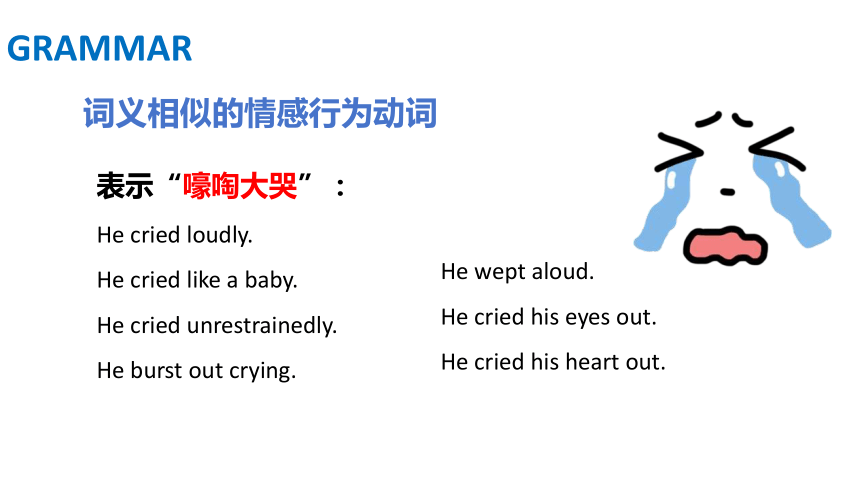
文档简介
(共43张PPT)
LESSON 3
WAR MEMORIES
UNIT 11 CONFLICT AND COMPROMISE
LEARNING OBJECTIVES
To read and talk about war memories;
To read for general understanding;
To read for specific information and deep understanding;
To compare personal opinions with the ideas of others;
To understand and learn words and expressions in context;
To recall and summarise information;
To learn and practise using verbs with similar meanings.
KEY POINTS AND DIFFICULT POINTS
To read and think about war memories;
To answer the comprehension questions;
To get key information from the passage;
To recall and summarise information after reading.
To learn words and expressions in context;
To struggle with complicated sentence structures;
To think critically and express opinions freely.
LEADING IN
Verbs with Similar Meanings
sob chat reply swear greet tell
weep speak shout whisper mention
Cry has a similar meaning to: ______________________________
Say has a similar meaning to: ____________________________________________________________
FOCUS ON LANGUAGE:
VERBS WITH SIMILAR MEANINGS
Put the words in the Word Builder into two groups and explain their difference in usage.
sob; weep
chat; reply; swear greet; tell; speak; shout; whisper; mention
A soldier from World War Ⅰ tells one of his war memories...
During the war, I had to work on an air base in South Africa. I remember once we had 24 hours off-duty, my friends and I had a night out in the town. We were walking slowly back to the base at about midnight, talking about the evening, when
FOCUS ON LANGUAGE:
VERBS WITH SIMILAR MEANINGS
Complete the text by choosing the correct options.
someone 1. mentioned/ spoke South Africa's famous wild animals. We were 2. chatting/ swearing about stories we'd heard when suddenly my friend, Bob, begged us to be quiet. "Be quiet yourself!" somebody 3. sobbed/ replied. Then I heard them. "No, everyone be quiet," I 4. whispered/ wept. And then we all could hear the lions."Quick, run!" someone
FOCUS ON LANGUAGE:
VERBS WITH SIMILAR MEANINGS
Complete the text by choosing the correct options.
___________
________
_______
___________
5. told/ shouted. We all ran towards our base. Everyone made it back except me—I fell into a trench! I stayed there till morning when I climbed out and walked back to the base. My friends 6. whispered/ greeted me like a hero. They thought I'd been eaten! I 7. swore/ chatted that I'd never go drinking and then walking in the wild at night again.
FOCUS ON LANGUAGE:
VERBS WITH SIMILAR MEANINGS
Complete the text by choosing the correct options.
_________
________
_______
GRAMMAR
词义相似的情感行为动词
一、表示“哭”
1. cry通常指难过伤心地哭。当我们喜极而泣时也用cry,同时cry还表达喊叫的意思。
The bride cried in delight at the wedding.
新娘在婚礼上喜极而泣。
As the saying goes: it's no use crying over spilled milk.
常言道:覆水难收。
GRAMMAR
一、表示“哭”
2. weep是因悲痛或悲哀而流泪。换句话说,weep是从心底发出来“声泪俱下”的恸哭。weep 常用于写作,并指流泪多于哭声,也就是重“泪”而不重“声”;cry 则是相反,是重“声”而不重“泪”。
She couldn't help weeping when she was reading the letter from her husband.
她读着丈夫的来信,情难自禁地流下眼泪。
词义相似的情感行为动词
GRAMMAR
一、表示“哭”
3. sob是指受委屈、虐待或悲伤而无处诉苦时,抽噎地唏嘘或哽咽而哭泣;sob也可以说是最容易引起别人同情和令人鼻酸的哭法。
The boy sobbed because he lost all of his money.
那男孩厌丢了他所有的钱而啜泣。
词义相似的情感行为动词
GRAMMAR
表示“嚎啕大哭”:
He cried loudly.
He cried like a baby.
He cried unrestrainedly.
He burst out crying.
词义相似的情感行为动词
He wept aloud.
He cried his eyes out.
He cried his heart out.
GRAMMAR
词义相似的情感行为动词
二、表示“笑”
1. laugh指发出较大声音的笑,通常表示极度开心或觉得某事非常有趣。
He's always good for a laugh.
他总能逗人发笑。
His first joke got the biggest laugh of the night.
他讲的第一个笑话博得了当晚最开怀的笑声。
GRAMMAR
词义相似的情感行为动词
二、表示“笑”
2. smile指较为轻微的笑,面部肌肉轻微收缩,嘴角上扬,通常表示友好、满意或礼貌。
He had a big smile on his face.
他笑容满面。
There was a ghost of a smile on his face.
他脸上露出隐隐的一丝微笑。
GRAMMAR
词义相似的情感行为动词
二、表示“笑”
3. smirk指表现出自满、得意情绪的笑,往往带有炫耀的意味。
He made no attempt to conceal his smirk.
他毫不掩饰自鸣得意的笑容。
She had a self-satisfied smirk on her face.
她满脸扬扬得意的样子。
GRAMMAR
词义相似的情感行为动词
二、表示“笑”
4. sneer指含有轻蔑、嘲讽意味的笑,通常不是出于真正的开心。
He said with a sneer.
他的话中带有嘲笑之意。
He sneered at people who liked pop music.
他嘲笑喜欢流行音乐的人。
GRAMMAR
词义相似的情感行为动词
二、表示“笑”
5. giggle通常指无意义地、不停地笑,有时带有天真或愚蠢的意味。
She has a happy little giggle.
她会快乐地小小声咯咯笑。
I get the giggles when I'm nervous.
我紧张时就不停地咯咯大笑。
GRAMMAR
词义相似的情感行为动词
二、表示“笑”
6. snicker指一种阴险、狡诈的笑,往往预示着不怀好意的行为。
One hand went up as the snickering diminished.
有一只手举了起来,同时窃笑声逐渐消失。
The other students snickered at the young man's question.
其它学生纷纷窃笑那位年轻人的问题。
GRAMMAR
表示“笑”:的短语
sneer at 讥笑
laugh wildly 狂笑
laugh uproariously 仰天大笑
laugh one's head off 捧腹大笑
burst into laughter after crying 破涕为笑
词义相似的情感行为动词
smile slightly 微微一笑
smile charmingly 嫣然一笑
smile knowingly 会心地笑
GRAMMAR
词义相似的情感行为动词
三、表示“说”
1. say是其中最常用的动词。强调的是所讲的内容,主语可以是人,也可以是物(文章、信件等)。say比较侧重于说话的内容。
I don't understand what you said.
我没听懂你刚说了什么。
I've said I'm sorry; what more do you want
我已经道歉了,你还要怎样
GRAMMAR
词义相似的情感行为动词
三、表示“说”
2. chat更倾向于表示“闲聊”。
They often chat together. 他们经常一起聊天。
I enjoy chatting with my friends.
我很享受和我的朋友们聊天。
They were soon chatting away like old friends.
他们很快就像老朋友一样聊起天来。
GRAMMAR
词义相似的情感行为动词
三、表示“说”
3. speak侧重于说话的能力,以及说话人一般有很高的地位。
(1)描述某人说话快或者声音吵,都用speak。
Sorry, I can't hear you clearly; could you please speak loudly
抱歉,我听不太清你说话,你能说话大点声吗?
GRAMMAR
词义相似的情感行为动词
三、表示“说”
(2)总统发言、大老板找人谈话,诸如这种需要一方服从的谈话,都要用speak。
I spoke to her last Wednesday.
上星期三我和她谈过了。
(句中的“她”就是处于被动地位,无力辩驳)
GRAMMAR
词义相似的情感行为动词
三、表示“说”
4. reply表示“回复”,侧重对他人做出回应。reply为不及物动词,在表达“对……做出回复”时,要使用词组reply to。
You should receive a reply within seven days.
你会在七天之内收到答复。
He never replied to any of my letters.
他从来没给我回过信。
GRAMMAR
词义相似的情感行为动词
三、表示“说”
5. shout表示“大声喊”,含有“斥责,怒骂”的意思。
The voice of the sea it is like a shout.
大海的声音就像呼喊。
Then he started shouting and swearing at her.
当时,他冲着她又叫又骂起来。
GRAMMAR
词义相似的情感行为动词
三、表示“说”
6. swear除了“郑重承诺,发誓要”的意思外,还有因愤怒而“咒骂”的含义。
She fell over and swore loudly.
她摔倒了,大骂了一声。
I swear (that) I never leave you.
我保证绝不离开你。
GRAMMAR
词义相似的情感行为动词
三、表示“说”
7. whisper表示“耳语”,侧重说话的声音很小。
Her voice fell to a whisper.
她的声音变小,成了耳语。
She leaned over and whispered something in his ear.
她探过身去附耳跟他说了些什么。
GRAMMAR
词义相似的情感行为动词
三、表示“说”
8. greet表示“打招呼,迎接”。表示“迎接某人”可以直接用greet sb.。
He greeted all the guests warmly as they arrived.
客人到达时他都热情接待。
He looked at Livy and Mark, who had risen to greet him.
他看着站起来跟他打招呼的莉薇和马克。
GRAMMAR
词义相似的情感行为动词
三、表示“说”
9. mention表示“顺便提到”,往往不是话题的中心,为及物动词。
Come to think of it, he did mention seeing you.
想起来了,他确实提到看见过你。
He mentioned some of his hobbies in the resume.
他在简历中提到了自己的一些爱好。
GRAMMAR
词义相似的情感行为动词
三、表示“说”
10. tell 表示“把某事告知某人”。
She told me to go to the office at once.
她叫我马上辩驳室。
I've told you time after time not to do that.
我一再告诉过你不要干那件事。
GRAMMAR
词义相似的情感行为动词
四、表示“看”
1. see侧重于看到、看见结果,而不怎么强调看的动作是否持续或者专注。
Bring it into the light so I can see it.
把它拿到亮的地方,好让我看见。
I can probably make the time to see them.
我大概能腾出时间去看望他们。
GRAMMAR
词义相似的情感行为动词
四、表示“看”
2. look通常表示有意识地去看,强调看的动作,而且常常与“at”搭配使用。
Look at the time! We'll be late.
看几点了!我们要迟到了。
Make sure you get a good look at their faces.
你一定要仔细看清他们的面孔。
GRAMMAR
词义相似的情感行为动词
四、表示“看”
3. watch强调的是专注地观察、注视事物的动作,并且这个动作通常持续时间较长。
I could sit and watch the river all day long.
我可以整天坐在这里看那条河。
Parents should control what their kids watch on television.
父母应该限定孩子看什么样的电视节目。
GRAMMAR
词义相似的情感行为动词
四、表示“看”
4. gaze凝视,注视。因为好奇、感叹或长时间目不转睛地看某物。
He sat for hours just gazing into space.
他一连几个小时坐在那里茫然地看着前面。
He gazed up at her with huge brown eyes.
他睁着棕色的大眼睛盯着她。
GRAMMAR
词义相似的情感行为动词
四、表示“看”
5. gape张着嘴、瞪大眼睛地看。这个词强调一种吃惊的状态。
The children gaped at the big elephant in the zoo.
在动物园,孩子们张大了嘴巴呆呆地看着大象。
She was gaping at it, lost for words.
她目瞪口呆地看着这场面,一时语塞。
GRAMMAR
词义相似的情感行为动词
四、表示“看”
6. glance粗略地、随便地一瞥,看一眼。
He glanced over the letter he had just received.
他把刚收到的那封信粗略地看了一遍。
I glanced up quickly to see who had come in.
我迅速抬头瞥了一眼看是谁进来了。
GRAMMAR
词义相似的情感行为动词
四、表示“看”
7. glare怒目而视。怀有敌意或在气愤的情绪下看某物。
She glares at me if I go near her desk.
我一走近她的办公桌,她就对我瞪眼。
The woman glared at the man after he shouted rudely at her.
那男人粗暴地冲她大声喊叫,她也怒目而视。
PRACTICE
1. Despite his ________________ (cry), no one came to his assistance.
2. I could have ________________ (weep) thinking about what I'd missed.
3. All we could hear were loud ________________ (sob), but no articulate words.
4. I just did it for a ________________ (laugh), but it got out of hand.
cries
wept
sobs
laugh
PRACTICE
5. She said she was enjoying herself but her ________________ (smile) was forced.
6. You shouldn't take anything she ________________ (say) at face value.
7. She laughed and ________________ (chat) but was, in truth, not having much fun.
8. It takes a long time to learn to ________________ (speak) a language well.
smile
says
chatted
speak
PRACTICE
9. Down through the years this town ________________ (see) many changes.
10. I found it a strain ________________ (look) after four children.
11. You can learn a great deal just from ________________ (watch) other players.
12. She felt increasingly uncomfortable under the woman's steady ________________ (gaze).
has seen
looking
watching
gaze
SUMMARY
Read and talk about war memories;
Read for general understanding;
Read for specific information and deep understanding;
Compare personal opinions with the ideas of others;
Understand and learn words and expressions in context;
Recall and summarise information;
Learn and practise using verbs with similar meanings.
Thank you
LESSON 3
WAR MEMORIES
UNIT 11 CONFLICT AND COMPROMISE
LEARNING OBJECTIVES
To read and talk about war memories;
To read for general understanding;
To read for specific information and deep understanding;
To compare personal opinions with the ideas of others;
To understand and learn words and expressions in context;
To recall and summarise information;
To learn and practise using verbs with similar meanings.
KEY POINTS AND DIFFICULT POINTS
To read and think about war memories;
To answer the comprehension questions;
To get key information from the passage;
To recall and summarise information after reading.
To learn words and expressions in context;
To struggle with complicated sentence structures;
To think critically and express opinions freely.
LEADING IN
Verbs with Similar Meanings
sob chat reply swear greet tell
weep speak shout whisper mention
Cry has a similar meaning to: ______________________________
Say has a similar meaning to: ____________________________________________________________
FOCUS ON LANGUAGE:
VERBS WITH SIMILAR MEANINGS
Put the words in the Word Builder into two groups and explain their difference in usage.
sob; weep
chat; reply; swear greet; tell; speak; shout; whisper; mention
A soldier from World War Ⅰ tells one of his war memories...
During the war, I had to work on an air base in South Africa. I remember once we had 24 hours off-duty, my friends and I had a night out in the town. We were walking slowly back to the base at about midnight, talking about the evening, when
FOCUS ON LANGUAGE:
VERBS WITH SIMILAR MEANINGS
Complete the text by choosing the correct options.
someone 1. mentioned/ spoke South Africa's famous wild animals. We were 2. chatting/ swearing about stories we'd heard when suddenly my friend, Bob, begged us to be quiet. "Be quiet yourself!" somebody 3. sobbed/ replied. Then I heard them. "No, everyone be quiet," I 4. whispered/ wept. And then we all could hear the lions."Quick, run!" someone
FOCUS ON LANGUAGE:
VERBS WITH SIMILAR MEANINGS
Complete the text by choosing the correct options.
___________
________
_______
___________
5. told/ shouted. We all ran towards our base. Everyone made it back except me—I fell into a trench! I stayed there till morning when I climbed out and walked back to the base. My friends 6. whispered/ greeted me like a hero. They thought I'd been eaten! I 7. swore/ chatted that I'd never go drinking and then walking in the wild at night again.
FOCUS ON LANGUAGE:
VERBS WITH SIMILAR MEANINGS
Complete the text by choosing the correct options.
_________
________
_______
GRAMMAR
词义相似的情感行为动词
一、表示“哭”
1. cry通常指难过伤心地哭。当我们喜极而泣时也用cry,同时cry还表达喊叫的意思。
The bride cried in delight at the wedding.
新娘在婚礼上喜极而泣。
As the saying goes: it's no use crying over spilled milk.
常言道:覆水难收。
GRAMMAR
一、表示“哭”
2. weep是因悲痛或悲哀而流泪。换句话说,weep是从心底发出来“声泪俱下”的恸哭。weep 常用于写作,并指流泪多于哭声,也就是重“泪”而不重“声”;cry 则是相反,是重“声”而不重“泪”。
She couldn't help weeping when she was reading the letter from her husband.
她读着丈夫的来信,情难自禁地流下眼泪。
词义相似的情感行为动词
GRAMMAR
一、表示“哭”
3. sob是指受委屈、虐待或悲伤而无处诉苦时,抽噎地唏嘘或哽咽而哭泣;sob也可以说是最容易引起别人同情和令人鼻酸的哭法。
The boy sobbed because he lost all of his money.
那男孩厌丢了他所有的钱而啜泣。
词义相似的情感行为动词
GRAMMAR
表示“嚎啕大哭”:
He cried loudly.
He cried like a baby.
He cried unrestrainedly.
He burst out crying.
词义相似的情感行为动词
He wept aloud.
He cried his eyes out.
He cried his heart out.
GRAMMAR
词义相似的情感行为动词
二、表示“笑”
1. laugh指发出较大声音的笑,通常表示极度开心或觉得某事非常有趣。
He's always good for a laugh.
他总能逗人发笑。
His first joke got the biggest laugh of the night.
他讲的第一个笑话博得了当晚最开怀的笑声。
GRAMMAR
词义相似的情感行为动词
二、表示“笑”
2. smile指较为轻微的笑,面部肌肉轻微收缩,嘴角上扬,通常表示友好、满意或礼貌。
He had a big smile on his face.
他笑容满面。
There was a ghost of a smile on his face.
他脸上露出隐隐的一丝微笑。
GRAMMAR
词义相似的情感行为动词
二、表示“笑”
3. smirk指表现出自满、得意情绪的笑,往往带有炫耀的意味。
He made no attempt to conceal his smirk.
他毫不掩饰自鸣得意的笑容。
She had a self-satisfied smirk on her face.
她满脸扬扬得意的样子。
GRAMMAR
词义相似的情感行为动词
二、表示“笑”
4. sneer指含有轻蔑、嘲讽意味的笑,通常不是出于真正的开心。
He said with a sneer.
他的话中带有嘲笑之意。
He sneered at people who liked pop music.
他嘲笑喜欢流行音乐的人。
GRAMMAR
词义相似的情感行为动词
二、表示“笑”
5. giggle通常指无意义地、不停地笑,有时带有天真或愚蠢的意味。
She has a happy little giggle.
她会快乐地小小声咯咯笑。
I get the giggles when I'm nervous.
我紧张时就不停地咯咯大笑。
GRAMMAR
词义相似的情感行为动词
二、表示“笑”
6. snicker指一种阴险、狡诈的笑,往往预示着不怀好意的行为。
One hand went up as the snickering diminished.
有一只手举了起来,同时窃笑声逐渐消失。
The other students snickered at the young man's question.
其它学生纷纷窃笑那位年轻人的问题。
GRAMMAR
表示“笑”:的短语
sneer at 讥笑
laugh wildly 狂笑
laugh uproariously 仰天大笑
laugh one's head off 捧腹大笑
burst into laughter after crying 破涕为笑
词义相似的情感行为动词
smile slightly 微微一笑
smile charmingly 嫣然一笑
smile knowingly 会心地笑
GRAMMAR
词义相似的情感行为动词
三、表示“说”
1. say是其中最常用的动词。强调的是所讲的内容,主语可以是人,也可以是物(文章、信件等)。say比较侧重于说话的内容。
I don't understand what you said.
我没听懂你刚说了什么。
I've said I'm sorry; what more do you want
我已经道歉了,你还要怎样
GRAMMAR
词义相似的情感行为动词
三、表示“说”
2. chat更倾向于表示“闲聊”。
They often chat together. 他们经常一起聊天。
I enjoy chatting with my friends.
我很享受和我的朋友们聊天。
They were soon chatting away like old friends.
他们很快就像老朋友一样聊起天来。
GRAMMAR
词义相似的情感行为动词
三、表示“说”
3. speak侧重于说话的能力,以及说话人一般有很高的地位。
(1)描述某人说话快或者声音吵,都用speak。
Sorry, I can't hear you clearly; could you please speak loudly
抱歉,我听不太清你说话,你能说话大点声吗?
GRAMMAR
词义相似的情感行为动词
三、表示“说”
(2)总统发言、大老板找人谈话,诸如这种需要一方服从的谈话,都要用speak。
I spoke to her last Wednesday.
上星期三我和她谈过了。
(句中的“她”就是处于被动地位,无力辩驳)
GRAMMAR
词义相似的情感行为动词
三、表示“说”
4. reply表示“回复”,侧重对他人做出回应。reply为不及物动词,在表达“对……做出回复”时,要使用词组reply to。
You should receive a reply within seven days.
你会在七天之内收到答复。
He never replied to any of my letters.
他从来没给我回过信。
GRAMMAR
词义相似的情感行为动词
三、表示“说”
5. shout表示“大声喊”,含有“斥责,怒骂”的意思。
The voice of the sea it is like a shout.
大海的声音就像呼喊。
Then he started shouting and swearing at her.
当时,他冲着她又叫又骂起来。
GRAMMAR
词义相似的情感行为动词
三、表示“说”
6. swear除了“郑重承诺,发誓要”的意思外,还有因愤怒而“咒骂”的含义。
She fell over and swore loudly.
她摔倒了,大骂了一声。
I swear (that) I never leave you.
我保证绝不离开你。
GRAMMAR
词义相似的情感行为动词
三、表示“说”
7. whisper表示“耳语”,侧重说话的声音很小。
Her voice fell to a whisper.
她的声音变小,成了耳语。
She leaned over and whispered something in his ear.
她探过身去附耳跟他说了些什么。
GRAMMAR
词义相似的情感行为动词
三、表示“说”
8. greet表示“打招呼,迎接”。表示“迎接某人”可以直接用greet sb.。
He greeted all the guests warmly as they arrived.
客人到达时他都热情接待。
He looked at Livy and Mark, who had risen to greet him.
他看着站起来跟他打招呼的莉薇和马克。
GRAMMAR
词义相似的情感行为动词
三、表示“说”
9. mention表示“顺便提到”,往往不是话题的中心,为及物动词。
Come to think of it, he did mention seeing you.
想起来了,他确实提到看见过你。
He mentioned some of his hobbies in the resume.
他在简历中提到了自己的一些爱好。
GRAMMAR
词义相似的情感行为动词
三、表示“说”
10. tell 表示“把某事告知某人”。
She told me to go to the office at once.
她叫我马上辩驳室。
I've told you time after time not to do that.
我一再告诉过你不要干那件事。
GRAMMAR
词义相似的情感行为动词
四、表示“看”
1. see侧重于看到、看见结果,而不怎么强调看的动作是否持续或者专注。
Bring it into the light so I can see it.
把它拿到亮的地方,好让我看见。
I can probably make the time to see them.
我大概能腾出时间去看望他们。
GRAMMAR
词义相似的情感行为动词
四、表示“看”
2. look通常表示有意识地去看,强调看的动作,而且常常与“at”搭配使用。
Look at the time! We'll be late.
看几点了!我们要迟到了。
Make sure you get a good look at their faces.
你一定要仔细看清他们的面孔。
GRAMMAR
词义相似的情感行为动词
四、表示“看”
3. watch强调的是专注地观察、注视事物的动作,并且这个动作通常持续时间较长。
I could sit and watch the river all day long.
我可以整天坐在这里看那条河。
Parents should control what their kids watch on television.
父母应该限定孩子看什么样的电视节目。
GRAMMAR
词义相似的情感行为动词
四、表示“看”
4. gaze凝视,注视。因为好奇、感叹或长时间目不转睛地看某物。
He sat for hours just gazing into space.
他一连几个小时坐在那里茫然地看着前面。
He gazed up at her with huge brown eyes.
他睁着棕色的大眼睛盯着她。
GRAMMAR
词义相似的情感行为动词
四、表示“看”
5. gape张着嘴、瞪大眼睛地看。这个词强调一种吃惊的状态。
The children gaped at the big elephant in the zoo.
在动物园,孩子们张大了嘴巴呆呆地看着大象。
She was gaping at it, lost for words.
她目瞪口呆地看着这场面,一时语塞。
GRAMMAR
词义相似的情感行为动词
四、表示“看”
6. glance粗略地、随便地一瞥,看一眼。
He glanced over the letter he had just received.
他把刚收到的那封信粗略地看了一遍。
I glanced up quickly to see who had come in.
我迅速抬头瞥了一眼看是谁进来了。
GRAMMAR
词义相似的情感行为动词
四、表示“看”
7. glare怒目而视。怀有敌意或在气愤的情绪下看某物。
She glares at me if I go near her desk.
我一走近她的办公桌,她就对我瞪眼。
The woman glared at the man after he shouted rudely at her.
那男人粗暴地冲她大声喊叫,她也怒目而视。
PRACTICE
1. Despite his ________________ (cry), no one came to his assistance.
2. I could have ________________ (weep) thinking about what I'd missed.
3. All we could hear were loud ________________ (sob), but no articulate words.
4. I just did it for a ________________ (laugh), but it got out of hand.
cries
wept
sobs
laugh
PRACTICE
5. She said she was enjoying herself but her ________________ (smile) was forced.
6. You shouldn't take anything she ________________ (say) at face value.
7. She laughed and ________________ (chat) but was, in truth, not having much fun.
8. It takes a long time to learn to ________________ (speak) a language well.
smile
says
chatted
speak
PRACTICE
9. Down through the years this town ________________ (see) many changes.
10. I found it a strain ________________ (look) after four children.
11. You can learn a great deal just from ________________ (watch) other players.
12. She felt increasingly uncomfortable under the woman's steady ________________ (gaze).
has seen
looking
watching
gaze
SUMMARY
Read and talk about war memories;
Read for general understanding;
Read for specific information and deep understanding;
Compare personal opinions with the ideas of others;
Understand and learn words and expressions in context;
Recall and summarise information;
Learn and practise using verbs with similar meanings.
Thank you
同课章节目录
- Unit 10 Connections
- Lesson 1 How Closely Connected Are We?
- Lesson 2 Community Spirit
- Lesson 3 Anne of Green Gables
- Unit 11 Conflict And Compromise
- Lesson 1 Living In a Community
- Lesson 2 Dealing with Conflict
- Lesson 3 War Memories
- Unit 12 Innovation
- Lesson 1 Scientific Breakthroughs
- Lesson 2 Aha Moment
- Lesson 3 Stephen Hawking
